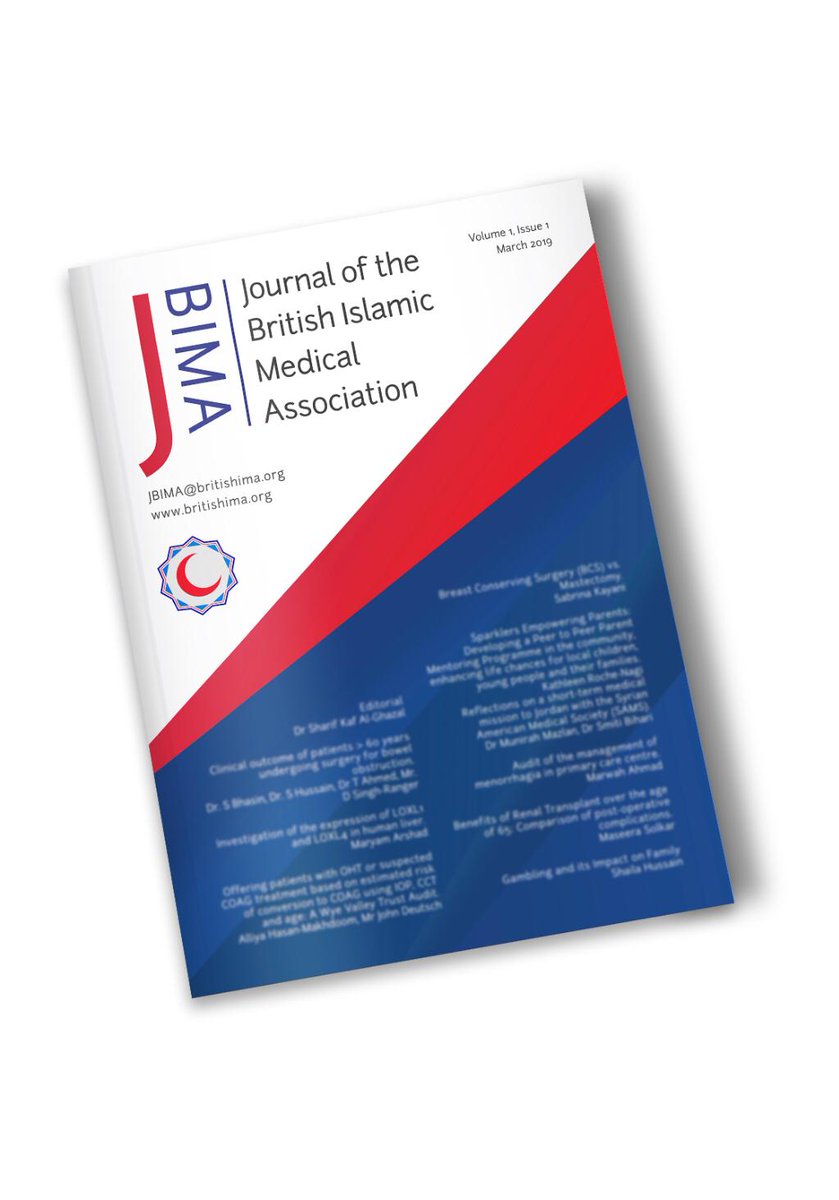
Abstract
The quest to practice Islam as a complete way of life is not something unusual for Muslims, especially for healthcare workers who are committed to the practice of Islam according to the teachings of our beloved Prophet Muhammad SAW. Thus, for committed Muslim healthcare workers, the practice of medicine should ideally be in line with the Islamic worldview. Their aim should principally be to seek the pleasure of Allah SWT through performing their utmost best while also serving humankind as part of their amaland as ibadah. The introduction of this Ibadah Friendly Hospital (IFH) has been recognized and accepted as one of the best ways of translating Islam in our daily life as healthcare workers as we are dealing with people who require support, in particular spiritual support. Its implementation can be adapted according to the situation be it in Muslim or non-Muslim countries. It provides the platform to seek His pleasure and perform our ibadah at all times and at any place while at work. The best of Allah’s creation (human beings) are cared for and aided in reaching the best state of health to facilitate their ibadah.
In the IFH, patient care is holistic in approach and should follow the guidelines as laid down by the Quran and Sunnah. Understanding and following Maqasid Al-Shariah and Qawaid Al-Fiqhiyyahare the key factors in the implementation of IFH. Here lie the opportunities to carry out and apply the concept of ‘Dakwahbil Hal’ in our work. It helps to improve the quality of services because the task being carried out is an amaland ibadah for us. In other words, this IFH is a process of Islamisation of health services which, if followed properly, will have a direct and positive impact in improving the quality of health services at large.
Introduction
Many FIMA members have played a significant and major role in the process of Islamisation of medical services in this modern era. Many excellent hospitals have started the Islamisation program since early 80s [1]. As an example, the Islamic Hospital in Jordan is a role model to many of us who dream of working in an Islamic environment and set up. TheIslamic Hospital of Jordan was built as a charity, non-profit training medical institution, whichstarted operations in 1982[2].The combination of up-to-date medical facilities with the Islamic elements in the running of the hospital has no doubt set an excellent exemplary model for hospitals in recent years. Although the management does not publicize this hospital as a Shariah compliant hospital, it is a known fact that they are following Islamic guidelines in their work process.
They not only provide excellent medical services to the people of Jordan but alsotothose around Jordan including many from Palestine. It has also been used as a training center for postgraduate and sub-specialitymedicaltraining in Jordan. Thereare many special Islamic Social Responsibility (ISR) programs beingpracticed in the hospital, such as creation of special funds for poor patients and infaq programs by doctors. These can easily be adopted by other hospitals which aspire to instill Islamic values in their operations.
Ibadah Friendly Hospital (IFH)
The development of the Ibadah Friendly Hospital and the Shariah Compliant Hospital stemmed from the Islamic Hospital of Jordan. The author’s personal experience while attending the FIMA Council meeting in 1992 hosted by the Islamic Hospital of Jordan had triggered the idea of setting up a similar hospital in Malaysia. The establishment of Al-Islam Specialist HospitalKuala Lumpur in 1996 was directly encouraged by the overall performance of this Islamic Hospital of Jordan. It was built with full conviction to set up an excellent Islamic hospital as well as a centre for Dakwah.Thus, Al-Islam Specialist Hospital under the Muslim Youth Movement of Malaysia (ABIM)was built to establish an institution with atauhidicparadigm.Without doubt, this programwas initiated as a result of the impressive and remarkable experience during the FIMA meeting at the Islamic Hospital of Jordan then[3].
Al-Islam Specialist Hospital wasbuiltwith a vision of establishing a hospital with Islamic concepts and integrating the Islamic values in the running of the hospital. However, in Malaysia, Hospital UniversitiSainsMalaysia (HUSM), a government teaching hospital, was the first to use the term “IFH” in 2004 as part of their process of integrating Islamic values in the running of the hospital[4].
Their programs were mainly focused on assisting their patients to pray plus having programs to mark and celebrate special Islamic events. As for Al-Islam Specialist Hospital, IFH was officially launched in 2006. The approach and vision was more inclusive and more comprehensive, not onlyinprovidingcareforpatientsand helping them perform their ibadah but also in the management of the hospital. In this program, the management has taken a proactive role in assimilating this noble concept at every opportunities available as part of the Dakwahbil Hal approach. Thus, we have introduced many new programs into the hospital such as Islamic Social Responsibility (ISR), Usrah, Tazkirah, daily Quranic reading (1 day 1 page) to mention a few.

FIGURE 1: Paradigm Shift In IFH
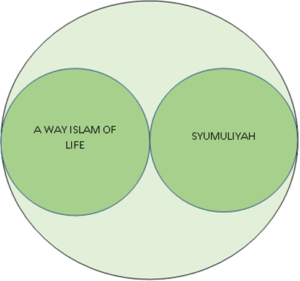
FIGURE 2: Islamic Worldview
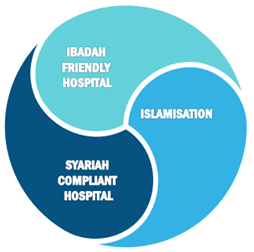
FIGURE 3: Islamisation of Health Services
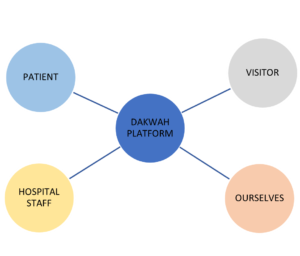
FIGURE 4: Ibadah Friendly Hospitals as Dakwah Platform
From 2006, Al-Islam Specialist Hospital has initiated and shared this noble concept and program with many hospitals in Malaysia and overseas both in private and government sectors. Many seminars and workshops were organized as part of our awareness campaign. With the mercy of Allah SWT, the Ministry of Health Malaysia (MOH) has adopted IFH as one of their official programs in 2014[4].This was a significant milestone for the IFH program since the MOH has given the blessing for the program to be an official program. Our Indonesian counterpart,MUKISI, working in partnership with the Indonesian Council of Ulamak(Majlis Ulama Of Indonesia-MUI)went one step furtherwhenthey established the Shariah Hospital Accreditation Program under MUKISI in 2016 [5].
Since then, they have established the standard instrument for certification of Shariah hospitals [5].Alhamdulillah, many of our FIMA members especially in Pakistan and Nigeria have taken the task of sharing this program and have even refined the program further [2].
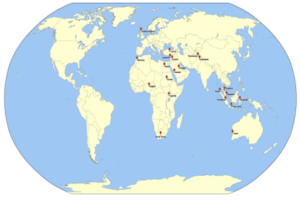
FIGURE 5: IFH Worldwide Program
What is an Ibadah Friendly Hospital (IFH)? What are the criteria for one? What is involved in establishing an Ibadah Friendly Hospital? Is it important for us to know what it is all about? Do we need to establish thisprogram in our hospital? Or are these hospitals meant to be owned by Muslims only? As for most of us, the term IFH is new and does not mean much and may not be relevant to us. Itmay not sound important to many of us, especially if we think we are successful in our career. The majority of our FIMA members havenot beenexposed to this concept or paid minimal attention to this issue of Islamisation in their medicalpractice.
Before we go further, let us ponder for a while and give a thought to these questions which will be relevant regarding this IFH:
1. How many of our Muslim patients perform their salat while they are under our care?
2. Who is responsible in helping Muslims patients perform their salat?
3. Have we ever discussed Islam or spirituality with the non-Muslims patients ?
4. Have we ever assisted terminally ill patients under our care in the final seconds of their life?
To answer the first question, it is estimated thatup to 80% of patients in the ward do not perform their salat in one of the government hospitals in Malaysia[6]. Can we imagine if it happened to ourselves or to our families?
Below are some of the reasons why they do not perform their prayers:
1. Patients assume they can replace their prayers later(qadha)[6]
2. They assumed they are being excused from praying because of their illness and being in the hospital[6]
3. Patients are ignorant about the need to pray while they are sick[6]
4. No assistance and guidance from medical staff[7]
5. Hospital management donot provide support and facilitate patients to perform their ibadah [8]
6. The assumptionthat the Muslim patients should understand and know their responsibility.
Have we ever thought who is going to help us to say Shahadah or remind us to remember Allah at the end of our life? How would we feel if our relatives died after resuscitation without being assisted to say the Shahadah? Are those duties expected from the Muslim staff? Are we aware that the ultimate goal of a Muslim is to die with KhusnulKhatimah?[9].Let us remind ourselves about the saying of the prophet Muhammad SAW: ‘The best amongst you are those who are beneficial to humankind’[10].
The concept ofziarah is such a noble act and good deeds to the Muslims[11].We are almostwith our patients every day to perform the ziarah. Are we not lucky enough to be selected amongst those who will get the barakah if we do the ziarah?Islam is a complete way of life[12].Our existence in this worldis to serve Him[13].Thus, for Muslims, we must perform our duties in anexcellent manner with full dedication. However, most of us are being brought up in a secular environment and system and so our understanding and practices of Islam are far from perfect. Fortunatelydespite this , the Islamic revival which started in theearly seventies has helpedus to increase our awareness regarding these conceptsand will hopefully set the foundations for future generations. .
Many Muslims, especially the youth, have started to understand and practice Islam as a way of life. The IFH program is a paradigm shiftfrom a secular into aTawhidic Paradigm[1].The concept of ibadah needs to be understood as including every single task we perform, so long as the intention is to seek the pleasure of Allah SWT[14]. Ibadah is no longer confined to salat,fasting,giving zakat, or performing Umrah or Hajj. It encompasses every single action of our life, provided it is done with good intention(niyah).Understanding this core issue of “Ibadah” is the key to the concept of Ibadah Friendly Hospitals. Taking into consideration the proper definitionof ibadah in Islam,we can apply the IFH concept in our current setup even to thoseworking in a non-Muslim society.
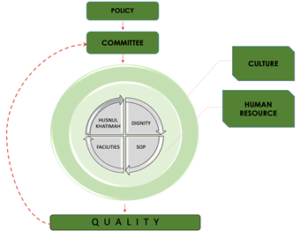
FIGURE 6: IFH Process Workfow
The objectives of IFH includes:
1. Towards achieving Mardhatillah(acceptance of AllahSWT)
2. Aiming for success in this world and the hereafter
3. Treating and managing patients using a holistic approach
4. Assisting ourselves/staff/patients and relatives to be closer to Allah SWT
5. Helping and guiding patients /staff/family to perform their ibadah especially salat
6. Providing the best services to the ummah/society
7. Application of work as ibadah and amal
8. Hospital as a platform for Dawah

FIGURE 7: Concept of Health in Islam
This IFH concept and program should be guided by :
1. Al-Quran and Sunnah
2. Maqasid Al-Shariah and Qawaid Al-Fiqhiyyah
3. Concept of Rukhsah and Dharurat
MaqasidAl-Shariah and QawaidAl-Fiqhiyyah in IFH
One of the most important developments in Islamic medical ethics is the application ofMaqasidAl-Shariah and QawaidAl-Fiqhiyyah in medical practice. This concept of MaqasidAl-Shariahwas coined by Al-Ghazali many years ago[3]. It has become an important tool in guiding our ethical consideration especially in today’s advancement in new technologies. The application has simplified our understanding of the problemsthat arise. It helps us in making decisions based on the broad criteria outlines such as preservation of religion,life,aqal,inheritance and property [15]. Al-Ghazali [3]has divided Maqasid Al-Shariah into three levels which include Dharuriah,HajiyatandTahsinat.The application of Maqasid Al-Shariahneed to be based on the principles of QawaidAl-Fiqhiyyah. This includes the principlesof Intention,Yakin,Hardship, Injury and Custom. The trust of IFH lies in the application of Maqasid Al- Shariah and Qawaid al-Fiqhiyyah.
TABLE 1:Maqasid Al-Shariah, The Purpose of Shariah
| MAQASIDAL-SHARIAH THE PURPOSE OF SHARIAH |
|
| To Preserve Religion | حفظ الدين |
| To Preserve Life | حفظ النفس |
| To Preserve Wisdom | حفظ العقل |
| To Preserve Inheritance | حفظ النسل |
| To Preserve Wealth | حفظ المال |
TABLE 2: Qawaid Al-Fiqhiyyah, Islamic Legal Maxims
| QAWAID AL-FIQHIYYAH ISLAMIC LEGAL MAXIMS |
|
| Principle of Motives | القصد |
| Principle of Certainty | اليقين |
| Principle of Injury | الضرر |
| Principle of Hardship | المشقة |
| Principle of Custom | العرف |
Principle of Rukhsah and Dharurat
As mentioned earlier, Islam is a complete way of life, thus Allah SWT has given us the guidelines forwhen we are faced with unusual and difficult situations.Westillneed to perform our ibadah even in situations which may be life threatening. This life threatening or difficult situation is called Dharurat-Quranand has mentioned on many occasions about the way we shall approach the situation such as in Surah An-Nisa aboutsalat andwudhu[16].When faced with this situation, we have to apply the principle of Rukhsah.In normal situation(Azimah) we have to follow the usual guidelines such as performing our salatwithin a specific period. However, when we are in a situation called Dharurat,then the concept of Rukhsah is applicable especially for patients. The most frequent situation is salat for patients in the wardi.e.,they can dojama’ prayer combining Zuhur and Asar or Maghrib and Ishaa’a.Other situations include the use of Tayammum replacing wudhu if the condition prohibits the use of water. As mentioned earlier, this is an essential concept which need to be understood in depth by Muslim healthcare givers if we want to apply the IFH program.
Standards In Ibadah Friendly Hospital:
The following discussion will focus on the proposed Standards In IFH.The list is long but these standards should be taken into consideration when planning the implementation of this program.
TABLE 3: STANDARDS IN IBADAH FRIENDLY HOSPITAL
1. HOSPITAL POLICY OF IMPLEME
| 1. | HOSPITAL POLICY OF IMPLEMENTING IFH: |
|
Adopting the IFH as a hospital policy |
|
| 2. | ORGANISATION STRUCTURE: |
| Establishment of an IFH Committee with specific job scope and organizational chart that reflects this aspiration. Direct involvement of the Hospital Director and senior members of the management in the IFH Committee Establishment of Spiritual Department or Chaplaincy Department in ensuring the successful implementation of IFH programs Regular meeting and report by the committee (at least 4x/year) |
|
| 3. | CULTURE IN IFH: |
| GENERAL CULTURE-good values – (Itqan/Ikhlas/Ihsan) SPECIFIC CULTURES-Culture of smiling &salam Reciting Bismillah/Alhamdulillah/Insha’Allah at appropriate time pre/during or post procedure Remembering God – for non-Muslims patients Campaign/poster/banner promoting these cultures and awareness of IFH Continuous monitoring of the staff practices and assimilation of these culture |
|
| 4. | HUMAN RESOURCE MANAGEMENT: |
| Basic training – awareness about IFH Introduction programs and basic trainings for all staff on IFH Preparation of manual for basic training in IFH REGULAR ongoing program – sustainability and monitoring |
|
| 5. | FACILITIES FOR IFH: |
| Orientation for patients about salat facilities and providing assistance to those needed Salat reminder/assisting patients to perform salat Audio visual facilities in reminding patients/staff on prayer Facilities to performsalat (Qibla direction/proper attire/clean area) Bottle spray/Tayammum powder/Books/Guidelines for prayer/wudhu/Tayammum) Patients attire – covering Awrah in ward/during delivery/ procedure & surgery Separate wards/rooms for different gender |
|
| 6. | SOPS IN IFH: |
| General SOPs – assimilation of good values at all levels-good character (akhlaq) SOPs in all clinical settings – orientation for new admission Pre & post procedures Chaperone Guiding and helping patients to perform ibadah |
|
| 7. | DIGNITY OF PATIENTS AND STAFF: |
| ECG by same gender Catheter performed by same gender Ensuring awrah of patients in OT/delivery rooms are being taken care of followingshariah guidelines |
|
| 8. | KHUSNUL KHATIMAH: |
| Establishing chaplaincy services – (talqin services/spiritual support for patients and relatives) Assisting family in preparing WASIAT/Family support Talqin – encouraging family to talqin patients/ensuring staff available to support patient during terminal stage Assisting family for the funeral arrangement |
|
| 9. | QUALITY MANAGEMENT: |
| Quality Committee in monitoring the implementation of IFH Internal and external audit Patient’s feedback regarding the IFH programs in the hospital Scheduled monitoring of the programs |
These are some of the suggested elements which could become the essentials in the implementation of IFH.There are many additional programs which need to be implemented in IFH. All departments and sections need to prepare SOPs and programs related to the IFH. The additional elements added in the normal SOPs are the added values of the hospital. It should be made known that there is only one set of SOPs in the hospital.
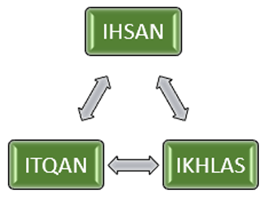
FIGURE8: Professional Muslim With Soul
Summary and conclusion:
The IFH program has been a major milestone in the process of Islamisation in our medical services. This program allows us the flexibility to bead’aeeat all the time.We are not only performing our duties but also performing our ibadah which we hope to be considered as amal if wecomplete them withtheproperniyah.Alhamdulillah, we have seen the interest, seriousness, and commitment of many of our FIMA brothers in implementing this program once they have listened and understood the real objectives and implication of this program.
The message is clear to those who understood this concept. In other words, IFH is for us to prepare for the hereafter (akhirah). It is immaterial whether we want to adopt the Shariah Hospital or IFH, because the ultimate aim is to get the blessing and acceptance of Allah SWT. For some of us, we can only apply and adopt part of the program since the conditions and situation is not in our favour. As for us at the Academy of Ibadah Friendly Hospital, we have given the commitment to share our 20 years of experience in implementing the IFH with our fellow FIMA members and to anybody interested in the program.
As part of our future undertaking of providing and preparing excellent services, Insha’Allah the Academy will be offering the Post Graduate Course in Islamic Chaplaincy soon. This program will be a joint program with the Markfield Institute in the UK and the University of Selangor (UNISEL). Let us pray to Allah to give us the opportunity to be the best ummah. Let us work together and translate Islam as rahmaton lil aalamin (mercy for all mankind) in our medical work.
REFERENCES:
1. Ur Rahman H, Mishal A, Ul-Haq N, Mas’ud S, Irfan M. Islamic Hospital Guidelines [Internet]. 2017. Available from: www.prime.edu.pk%0Awww.pima.org.pk
2. (2014).HospitalMesraIbadah. Hospital Pakar Al Islam. 1st ed. Kuala Lumpur: Page One Communication
3. (2016). Outline: Ibadah Friendly Hospitals. 1st ed. Kuala Lumpur: Hospital Pakar Al-Islam
4. Ministry of Health Malaysia. https://www.moh.gov.my. 30 November 2020
5. Jusuf Saleh Bazed. 2015. Standar&InstrumenSertifikasiRumahSakitSyariah. MUKISI (MajelisSyuroUpayaKesehatan Islam Indonesia). Versi 1436. Jakarta.
6. Aris, M. S. M., Rani, M. D. M., Jaafar, M. H., Norazmi, A. ‘Ubaidah A., & Umar, N. S. (2017). Knowledge, attitude, and practice of performing prayers (Salat) among Muslim patients in hospital Langkawi, Kedah: Roles of muslim healthcare providers. Advanced Science Letters, 23(5), 4955–4959. https://doi.org/10.1166/asl.2017.8975
7. Ainuddin, M. O. H. D. Z., Akar, A. B. U. B., Amiaah, S. I. T. I. J., &Alil, A. B. J. (2020). PELAKSANAAN BIMBINGAN SPIRITUIL DI HOSPITAL MESRA IBADAH ( HMI ) NEGERI SELANGOR. Asian Journal of Civilizational Studies, 2(1), 80–90
8. Nur Hidayah Kadir, ZurinaKefeli, Z. A. M. (2019). Adoption of Shariah-Based and Muslim Friendly Practices: A Case Study of Selected Medical Tourism Hospitals in Malaysia. In Z. K. Ahmad, Mohamad Yazis Ali BasahSuhaila Abdul Hamid Nor Haziah Hashim Nursilah (Ed.), 8th INTERNATIONAL ISLAMIC ECONOMIC SYSTEM CONFERENCE 2019 (I-iECONS 2019) 23 (Vol. 2019). Retrieved from https://www.researchgate.net/profile/Aimi_Kamarubahrin/publication/344749599_Accountability_Measurement_in_Waqf_Institutions_A_Qualitative_Survey/links/5f8d8baa458515b7cf8b75f6/Accountability-Measurement-in-Waqf-Institutions-A-Qualitative-Survey.pdf#page=
9. Hadith narrated by Abu Daud, 3316
10. Hadith narrated by Ahmad, Ath-Thabrani, Ad-Daruqutni
11. Riwayat Al-Tirmizi, 2008
12. Al-Quran (16:89)
13. Al-Quran (51:56)
14. Al-Quran (6:162)
15. Yahaya, R. R. (2018). What is Shariah Compliant Hospital Criteria and Scope? International Journal of Academic Research in Business and Social Sciences, 8(5), 1043–1051. https://doi.org/10.6007/ijarbss/v8-i5/4483
16. Al-Quran (4:43)

